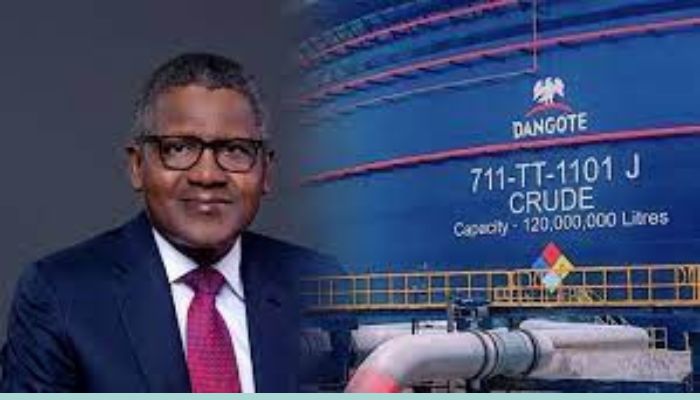
Dangote Refinery says it has deployed 4,000 brand-new Compressed Natural Gas (CNG)-powered tankers to ensure nationwide delivery of petroleum products.
The above development, according to industry experts, will not only disrupt existing supply chains but also address two chronic issues in Nigeria’s downstream sector: frequent fuel tanker accidents and perennial strike threats by petroleum tanker drivers.
With this, the refinery will bypass depots and deliver directly to petrol stations, manufacturers, aviation companies, telecom firms, and other bulk fuel users, offering free logistics as an incentive.
“Our goal is to provide equitable access to affordable fuel for all Nigerians, regardless of location, making energy more accessible and sustainable for everyone, wherever they may be,” Dangote said.
This strategy not only reduces operational costs for retailers but also threatens to marginalise existing depot owners, many of whom have profited for decades as middlemen in the petrol supply chain.
With free delivery and potential credit facilities, Dangote’s model represents a direct challenge to the traditional logistics-dependent structure of fuel distribution in Nigeria.
Depot owners, already grappling with operational costs and reduced margins, now face further pressure.
“This development could severely undercut our market relevance,” lamented a depot operator in Apapa who spoke anonymously. “If marketers can now source fuel directly at competitive rates and get free transportation, we’re left with little value
Historically, depot owners have served as intermediaries between importers or refineries and retail stations, often charging significant premiums for storage and distribution.
However, Dangote’s model, powered by an integrated supply chain and large-scale infrastructure investment, reduces reliance on third-party services.
“This is the Uber moment for the Nigerian fuel sector,” a senior oil executive told repoters “With 4,000 CNG tankers, the refinery can deliver directly to any station nationwide. This removes the need for depot owners unless they can offer something dramatically better or cheaper.”
In a country where logistics often account for a significant portion of fuel cost, Dangote’s free delivery policy may become a game-changer.
For petrol marketers, the opportunity to reduce delivery expenses while gaining access to a stable supply is a welcome relief, especially amid recent volatility in global oil markets.
Beyond urban centres and large fuel retailers, the initiative is also expected to breathe life into struggling and inactive petrol stations in rural areas. Many of these stations have been unable to operate due to high costs associated with product transportation and inconsistent supply.
Dangote’s direct distribution plan is expected to rejuvenate these outlets, increasing petrol accessibility in underserved communities and potentially creating thousands of new jobs in the retail and logistics sectors.
“It is expected to revitalise previously inactive petrol stations, thereby driving job creation, stimulating small and medium-sized enterprises (SMEs), increasing government revenue, improving fuel access in rural and underserved communities, and strengthening investor confidence in Nigeria’s downstream petroleum sector,” Dangote said.
In addition to fuel retailers, industrial users, such as manufacturers and telecommunications companies, stand to benefit. Lower fuel costs can translate into reduced production expenses, lower consumer prices, and potentially curb inflationary pressures.
To support high-volume users, the refinery is offering a credit scheme: purchasers of 500,000 litres or more can access an additional 500,000 litres on credit for a period of two weeks, backed by a bank guarantee.
The incentive is designed to encourage early adoption and streamline large-scale distribution.
“This pioneering effort marks a major milestone in our vision to revolutionise Nigeria’s energy sector. Dangote Refinery is dedicated to ensuring that no place is left behind,”
The refinery acknowledged federal government support, particularly the Naira-for-Crude scheme, which has provided a buffer against global price volatility.
Observers see the move as a clear endorsement of the government’s push for local refining capacity and a shift away from costly fuel imports.
Nigeria has long struggled with tanker-related accidents that have led to thousands of injuries, deaths, traffic gridlocks, and billions of naira in damages. Overloaded, poorly maintained diesel-powered trucks have contributed significantly to this danger, especially on highways linking port cities to inland fuel depots.
The introduction of 4,000 modern CNG-powered trucks by Dangote is expected to dramatically change that. These newer models are designed with advanced safety features, GPS tracking, and are built to global safety and environmental standards. Unlike traditional diesel tankers, CNG trucks operate at lower combustion risks and are less prone to overheating, two major causes of fuel tanker fires.
Equally impactful is Dangote’s approach to tanker driver relations. Over the years, Nigeria has witnessed repeated strike actions by petroleum tanker drivers, usually triggered by disputes over poor remuneration, road conditions, and extortion by security officials. These strikes have frequently disrupted nationwide fuel supply, leaving consumers stranded and pushing up fuel prices.
With Dangote now controlling a dedicated, company-managed fleet of tankers, the risk of such disruptions is significantly reduced. By directly employing drivers under standardised contracts, safety protocols, and better pay structures, the company effectively insulates its distribution network from the unrest that typically plagues third-party logistics providers.
